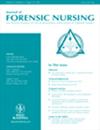Pragmatic Randomized Control Trial of a Coordinated Community Response: Increasing Access to Services for At-Risk Older Adults
IF 0.9
4区 医学
Q3 CRIMINOLOGY & PENOLOGY
引用次数: 0
Abstract
ABSTRACT Background Elder abuse, neglect, and financial exploitation (EANF) impacts over five million community-dwelling older adults. Yet, no evidence-based intervention models exist that prevent EANF. Objectives In this article, we describe the assessment of process outcomes for a Community Complex Care Response Team (C3RT) model developed, via a practitioner–researcher partnership, to reduce instances of EANF victimization among higher risk community-dwelling older adults by identifying and coordinating their service needs. Specifically, we evaluated whether this C3RT approach produced more service coordination among providers (measured as documented interagency communications), more referrals for services, and more enrollment in services. Methods A pragmatic randomized control trial using a 1:1 randomization scheme allocated participants to either the C3RT intervention (N = 74) or standard practice (N = 72) group offered by a local Area Agency on Aging. Outcome data were extracted from the participants' administrative service records. Results The participants assigned to C3RT had significantly more interagency communications and services provided (p < 0.05) than those in standard practice. Conclusions Communications and services increased across a broad range of multidisciplinary services, which attend to the social determinants of health. This study is the first to use objective outcome measures to evaluate the processes of a coordinated community response approach systematically.协调社区反应的实用随机对照试验:增加高危老年人获得服务的机会
摘要背景老年人虐待、忽视和经济剥削影响着500多万居住在社区的老年人。然而,目前还没有基于证据的干预模型可以预防EANF。目的在本文中,我们描述了社区综合护理反应小组(C3RT)模型的过程结果评估,该模型是通过从业者-研究者合作开发的,旨在通过识别和协调社区老年人的服务需求来减少高风险老年人的EANF受害情况。具体而言,我们评估了这种C3RT方法是否在提供者之间产生了更多的服务协调(以记录的跨部门沟通衡量)、更多的服务推荐和更多的服务注册。方法一项实用的随机对照试验采用1:1随机化方案,将参与者分配到当地老龄化机构提供的C3RT干预组(N=74)或标准实践组(N=72)。结果数据是从参与者的行政服务记录中提取的。结果被分配到C3RT的参与者比标准实践中的参与者提供了更多的跨部门沟通和服务(p<0.05)。结论在广泛的多学科服务中,沟通和服务有所增加,这些服务涉及健康的社会决定因素。这项研究首次使用客观的结果衡量标准来系统地评估社区协调应对方法的过程。
本文章由计算机程序翻译,如有差异,请以英文原文为准。
求助全文
约1分钟内获得全文
求助全文
来源期刊

Journal of Forensic Nursing
NURSING-
CiteScore
1.50
自引率
10.00%
发文量
120
期刊介绍:
The Journal of Forensic Nursing (JFN) the official journal of the International Association of Forensic Nurses, is a groundbreaking publication that addresses health care issues that transcend health and legal systems by articulating nursing’s response to violence. The journal features empirical studies, review and theoretical articles, methodological and concept papers, and case reports that address the provision of care to victims and perpetrators of violence, trauma, and abuse. Topics include interpersonal violence (sexual assault, abuse, intimate partner violence); death investigation; legal and ethical issues; forensic mental health nursing; correctional nursing; and emergency and trauma nursing.
 求助内容:
求助内容: 应助结果提醒方式:
应助结果提醒方式:


